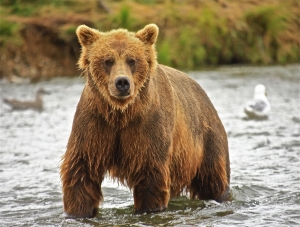 Few things have been so controversial in this world than the debate over whether a bear hibernates. Okay, that might not be entirely true; however, seeing as we’ve been told since we were wee lads that not only do bears hibernate, but they are the poster child of this wintertime slumber, it’s a bit disturbing to realize that all of it might have been a ruse.
Few things have been so controversial in this world than the debate over whether a bear hibernates. Okay, that might not be entirely true; however, seeing as we’ve been told since we were wee lads that not only do bears hibernate, but they are the poster child of this wintertime slumber, it’s a bit disturbing to realize that all of it might have been a ruse.
In fact, turns out the bear might just be extremely lazy and lethargic during the cold months. Who can blame them? Alas, there are animals who do, in fact, hibernate. Yet those who do hibernate pale in comparison to the majestic size and presence of bears, which is why, perhaps, we’ve been lied to for all these years. Thinking a bear hibernates just sounds cool, right?
What is hibernation?
While we all think of hibernation as passing the wintertime in sleep mode, there’s more to it than that. In fact, if a long sleep defined hibernation, then bears would technically hibernate, as would anyone north of Florida. But hibernation is a form of metabolic suppression that serves as a survival tactic for animals during times of energy crisis. Actually, some animals live most of their lives in a state of hibernation, meaning we could go as far as to say that their ridiculously low metabolic rate (like, near death low) is normal for them, and not hibernation. We correlate hibernation with the winter, justly so, but animals can also rely on this survival skill during times of extreme famine or drought. In the end, the purpose of hibernation is to preserve energy during expected times of food scarcity (hence why we see animals hibernate during the winter).
Fun facts about hibernation
-
The longest hibernating period on record lasted just over a year, performed with sheer brilliance by a spry marsupial.
-
Animals survive this long stage in many ways. Some live off their stored body fat. Others gorge like it’s Thanksgiving and then store that energy in fat deposits.
-
Some mammals hibernate while pregnant, and will give both during hibernation (perhaps that’s the animal kingdom’s form of pain meds?) or shortly after.
-
A hibernating animal will often drop its temperature to near freezing (whereas a bear will drop its temperature by 10 degrees or so).
-
True hibernators wake up from their “nap” like a teenager at 9 a.m. It takes them a long time to get their bearings … speaking of bearings, bears can wake up in an instant, because they’re not in as deep a recessive state as hibernators, thus you shouldn’t go poking around bears in the winter.
So who does hibernate?
If bears have let us down, is it possible that no other animal on this planet hibernates? Is hibernation synonymous with unicorns and fat-free fat – myths?
No, my friends, there are animals that do in fact past the criteria set out by the hibernation police. They include:
-
Squirrels! Squirrels are awesome hibernators. I know when it’s fall time because when I walk my dogs, all they see is squirrels. Why? These little rodents are filling up the cupboards for a few months of na-nights time. Squirrels are like power-napping hibernators. They can go down for a few days or weeks, come back up, eat a snack, and do it again.
-
Lemurs (the fat-tailed dwarf lemur of Madagascar) will hibernate for 7 months. That’s crazy talk, seeing as its not all that cold down there, but the lemur likes its warmth. If his tree hole is poorly insulated while hibernating, he’ll instinctively stay under the spell for longer, just to ride out the storm.
-
Hedgehog (or woodchuck). This little guy really knows how to hibernate. Sometimes he’ll go under in September, at the first hint of brisk air, and won’t come back out until long after we celebrated St. Patrick’s Day.
Can’t we just say that bears hibernate?
Sure we can! We say that Columbus discovered that the Earth was round (no one back then really believed it was flat, except for the same people who today believe that we’re aliens from 10,000 years in the future who have lost our way). So why can’t we say bears hibernate? For all intents and purposes, they do. They experience metabolic suppression and some data suggests that adult-sized bears can reduce their metabolic rate some 75% below normal. So while other hibernators drop their body temperatures way down (and bears don’t), bears still can do some pretty remarkable things with their body to survive the winter. Not to mention bears can recycle their urine.
What?
Yes, they recycle their urine so that they don’t have to get up and pee for months. If that’s not worth some type of prize, I don’t know what is.





